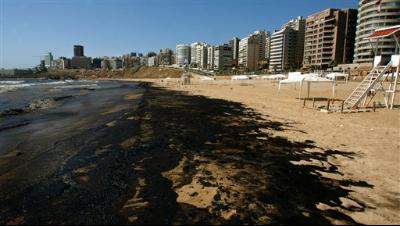|
|
Israeli Bombing Creates Mediterranean Environmental Disaster
Posted by Pile
(9951 views) |
 [Terroir-ism] |
 Israeli bombings in Lebanon have created a huge oil slick that may become the worse environmental disaster in the country's history, it was reported Saturday. Israeli bombings in Lebanon have created a huge oil slick that may become the worse environmental disaster in the country's history, it was reported Saturday.The slick, moving up the Mediterranean coast of Lebanon toward Syria, involves at least 25,000 tons of thick fuel oil, The New York Times reported. Its environmental damage is being compared to that of the Exxon Valdez spill, when a tanker ran aground and spilled about 40,000 tons of oil into Prince William Sound in Alaska in 1989. | |
Israeli forces bombed the tanks at the power station on July 14 and July 15, just days into their offensive on Lebanon which has seen blistering air strikes across the country and a bloody ground incursion in the south. The leak from one of the tanks, which are located just 25 metres (80 feet) from the sea, has now stopped but another containing 25,000 tons of fuel oil is still on fire and is in danger of exploding. Between 8,000-10,000 tons of fuel are on the shore and 5,000 on the open water. "Until now, the worst ecological disasters have taken place in the oceans and it's the first time that an oil spill has happened outside the open sea," said Sarraf. "We can have no illusions." Sarraf said that the cost of cleaning up Lebanon's once golden beaches -- which until the bombardment were major attractions for locals and tourists -- will cost between 45-50 million dollars and would not be finished until next summer. The spill is now affecting 70 kilometres (40 miles) of Lebanon's 220-kilometre-long (140 miles) coast, a third of its coastline. Beaches and rocks are covered in a black sludge which has reached the famous tourist town of Byblos, north of Beirut. "If nothing is done, not only will currents flowing towards the north mean that one third of Lebanon's coastline be hit, but also Cyprus, Syria, Turkey, Greece and even Israel," Sarraf said. "The fauna and the Mediterranean ecosystem risk suffering badly and certain species are threatened with extinction," he warned. Sarraf said that owing to the Israeli blockade of Lebanon's waters, it was impossible to send ships to clear up the pollution. "I have appealed to Britain, Italy, Spain, the United States, all the countries which have already suffered oil slicks to ask for technical assistance as we cannot act on our own," he said. Kuwait has sent 40 tons of material that would allow the petrol to thicken and also special carpets which absorb petroleum products. A resident of Byblos, known worldwide for its seafood restaurants and historic harbour, said "for the last four days, fish, crustaceans and crabs have been coming in black, and they are dying as victims of this oil slick." Fuad Hamdan, director of Friends of the Earth, Europe, and founder of Greenpeace Lebanon, agreed that "it is certainly the worst environmental disaster ever on the eastern Mediterranean coast." Hamdan said the eastern Mediterranean coast from the Israeli port of Haifa until Syria's Lattakiya was already heavily polluted from Israeli industry, Lebanese sewage and industry from east Beirut and from Syria. He advised people against eating fish from coastal areas. "Anyway it will smell bad and put people off." Besides the oil slick, the fire from the oil tanks has caused atmospheric pollution which has already reached Beirut. "Now the toxic cloud is stretching over a 30 kilometre distance," said Sarraf. | |
Details | |
| Sad Posted by Macy Smith on 2010-11-02 17:58:13 |
| IT's soooooo sad how these things happen. UGH |
| 1 Article displayed. |


 Bumper Sticker Store
Bumper Sticker Store



